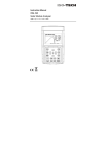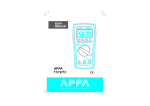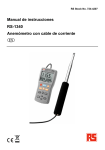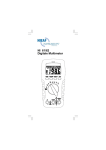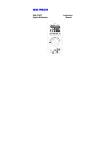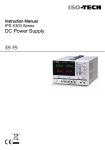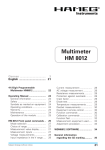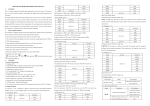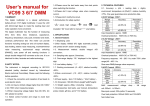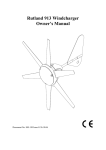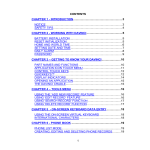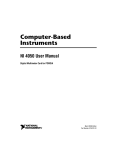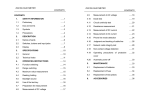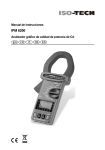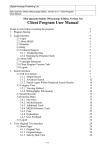Download Instruction Manual IDM 71/72/73 Digital Multimeter
Transcript
Instruction Manual IDM 71/72/73 Digital Multimeter EN FR IT DE Warning Caution .......... .......... .......... ........ ......... .......... .......... ........ ......... Safety Alert Symbol : READ and UNDERSTAND all safety alert symbols : in this manual. Failure to read and understand safety instructions can result in INJURY or DEATH Limited Warranty This meter is warranted to the original purchaser against defects in material and workmanship for 3 years from the date of purchase. During this warranty period, RS Components will, at its option, replace or repair the defective unit, subject to verification of the defect or malfunction. This warranty does not cover fuses, disposable batteries, or damage from abuse, neglect, accident, unauthorized repair, alteration, contamination, or abnormal conditions of operation or handling. Any implied warranties arising out of the sale of this product, including but not limited to implied warranties of merchantability and fitness for a particular purpose, are limited to the above. RS Components shall not be liable for loss of use of the instrument or other incidental or consequential damages, expenses, or economic loss, or for any claim or claims for such damage, expense or economic loss. Some states or countries laws vary, so the above limitations or exclusions may not apply to you. For full terms and conditions, refer to the current RS Catalogue. 1 Table of Contents Title SAFETY 2 Page 3 “Warning" and “Caution"Alert Symbol Statements Warning and Cautions Symbols as Marked on The Meter Symbols and Terms in The Manual Safety Compliance And Certification Safety Compliance Safety Certification Introduction Unpacking and Inspection Environmental Conditions Meter Description Making Basic Measurements Preparation and Caution Before Measurement Measuring AC/DC Voltage and Frequency Measuring Resistance Measuring DC µA and AC / DC A Current Measuring Capacitance Testing Diodes and Continuity Features Features Description Features Available vs Functions Using The Features Manual Ranging and Auto Ranging Min Max Recording Mode RS-232 Display Hold Backlight Auto Power Off (Battery Saver) 3 3 4 5 6 6 6 7 7 7 8 8 8 9 9 10 12 13 14 14 14 15 15 15 16 16 16 17 Disable Auto Power Off Maintenance Cleaning and Storage Fuse Replacement Battery Replacement Trouble Shooting Basic Trouble Shooting Testing the Fuse and Test Leads Specification General Specification Electrical Specification 17 18 18 18 19 19 19 19 20 20 20 Safety Safety "Warning" and "Caution" Alert Symbol Statement : " Warning" Alert Symbol A "Warning" Statement identifies hazardous conditions and actions that could cause BODILY HARM or DEATH. " Caution" Alert Symbol A " Caution" Statement: identifies conditions and actions that could DAMAGE the meter or the equipment under test. " Warnings" and " Cautions" : Warnings ․ When using test leads or probes, keep your fingers behind the finger guards. ․ Remove test lead from meter before opening the battery door or meter case. ․ Use the meter only as specified in this manual or the protection by the meter might be impaired. ․ Always use proper terminals, switch position, and range for measurements. ․ Never attempt a voltage measurement with the test Lead inserted into the A input terminal. ․ Verify the meter’s operation by measuring a known voltage. If in doubt, have the Meter serviced. ․ Do not apply more than the rated voltage, as marked on meter, between terminals or between any terminal and earth ground. ․ Do not attempt a current measurement when the open circuit voltage is above the fuse protection rating. Check the open circuit voltage with the voltage function. ․ Only replace a blown fuse with one of the proper rating as specified in this manual. ․ Use caution with voltages above 30 Vac rms, 42 Vac peak , or 60 Vdc. These voltages pose a shock hazard. 3 Safety ․ To avoid false readings that can lead to electric shock and injury, replace battery as soon as low battery indicator appears. ․ Disconnect circuit power and discharge all high-voltage capacitors before testing resistance, continuity, diodes, or capacitance. ․ Do not use the meter around explosive gas or vapor. ․ To reduce the risk of fire or electric shock, do not expose this product to rain or moisture. Cautions ․ Disconnect the test leads from the test points before changing the position of the function rotary switch. ․ Never connect a source of voltage with the function rotary switch in Ω/:</ A //Hz position. ․ Do not expose Meter to extremes of temperature or high humidity. ․ Never set the meter in A function to measure the voltage of a power supply circuit in equipment, as it could result in damage the meter and the equipment under test. Symbols as Marked on The Meter : : AC (Alternating Current) : DC (Direct Current) : Caution, Risk of Electric shock. To alert you to the presence of a potentially hazardous voltage. : Caution, Risk of Danger. Refer to Warnings and Cautions in the manual. : : 4 Double Insulation protection against electric shock. Conforms to European Union directives. Safety Symbols and Terms in The Manual Symbols : : Caution, Risk of Danger. Warning : Identifies hazardous conditions and actions that could cause BODILY HARM or DEATH Caution : Identifies conditions and actions that could DAMAGE the meter or equipment under test. : Fuse. Terms : CAT Level : Over Voltage Category Level defines at which circuit level masurements may be safely made. Different category circuits have different high-voltage transients. PER IEC 1010 OVERVOLTAGE INSTALLATION CATEGORY OVERVOLTAGE CATEGORY Ⅰ Equipment of OVERVOLTAGE CATEGORY Ⅰ is equipment for connection to circuits in which measurements are taken to limit the transient overvoltage to an appropriate low level. Note examples include protected electronic circuits. OVERVOLTAGE CATEGORY Ⅱ Equipment of OVERVOLTAGE CATEGORY Ⅱ is energy consuming equipment to be supplied from a fixed installation. OVERVOLTAGE CATEGORY Ⅲ Equipment of OVERVOLTAGE CATEGORY Ⅲ is equipment in fixed installations. Note examples include switches in a fixed installation and some equipment for industrial use with permanent connection to the fixed installation. OVERVOLTAGE CATEGORY Ⅳ Equipment of OVERVOLTAGE CATRGORY Ⅳ is for use at the origin of the installations. Note examples include electricity meters and primary over-current protection equipment. PER IEC1010 Pollution degree POLLUTION Addition of foreign matter, solid, liquid or gaseous (ionized gases), that may produce a reduction of dielectric strength or surface resistively. POLLUTION degree For the purpose of evaluating spacing of this product, the following degrees of POLLUTION in the microenvironment are defined. 5 Safety Compliance And Certification POLLUTION DEGREE 1 No POLLUTION or only dry, non-conductive POLLUTION occurs. The POLLUTION has no influence. POLLUTION DEGREE 2 Normal POLLUTION only non-conductive POLLUTION occurs. Occasionally, however, a temporary conductivity caused by condensation must be expected. POLLUTION DEGREE 3 Conductive POLLUTION occurs, or dry, non-conductive POLLUTION occurs which becomes conductive due to condensation, which is expected. NOTE : In such conditions equipment is normally protected against exposure to direct sunlight, precipitation, and full wind pressure, but neither temperature nor humidity is controlled. Safety Compliance And Certification Safety compliance The meter conforms to CENELEC LVD (Low-Voltage directive) 73/23/EEC and EMC (Electromagnetic Compatibility directive) 89/336/EEC The meter meet the requirements of IEC 61010-1 (2001) , EN 61010-1 (2001), UL 3111-1 (Jan.1994) , CSA C22.2 NO.1010-1-92 +A2: Feb. 1997 Safety Certification : TEST EQUIPMENT RISK ASSESSMENT Users of this equipment and or their employers are reminded that Health and Safety Legislation require them to carry out a valid risk assessments of all electrical work so as to identify potential sources of electrical danger and risk of electrical injury such as from inadvertent short circuits. Where the assessments show that the risk is significant, the use of fused test leads constructed in accordance with the HSE guidance note GS38 “ Electrical Test Equipment for use by Electricians” should be used. 6 Introduction Introduction Unpacking and Inspection Upon removing your new Digital Multimeter from its packing, you should have the following items. 1. Digital Multimeter. 2. Test lead set (one black, on red) 3. User Manual. 4. Protective holster. Environmental Conditions This product is safe at least under the following conditions: 1. Indoor Use 2. Altitude up to 2000 Meter 3. Operating Temperature and Relative Humidity : Non-condensing ≦10°C ,11°C ~ 30°C (≦80% R.H) 31°C ~ 40°C (≦75% R.H), 41°C ~ 50°C (≦45% R.H), 4. Storage Temperature and Relative Humidity : -20°C ~ 60°C (0 ~ 80% R.H) when battery removed from Meter. 5. Pollution degree 2 6. Installation category : The standard 70 series models meet the requirements for double insulation to IEC 61010-(2001), EN61010 (2001), UL3111-1(6.1994), CSA C22.2 NO.1010-1-92 to terminals: V/Ω/µA IDM 71,72 and 73 : Cat. Ⅳ 600 Volts. A IDM 72 and 73 only : Cat. Ⅳ 600 Volts. 7. Shock Vibration : Sinusoidal vibration per Mil-T-28800E (5 ~55 Hz, 3g maximum). 8. Drop Protection : 4 feet drop to hardwood on concrete floor. 7 Introduction The Meter Description Front Panel Illustration 1. 6000 count LCD display. 2. Push-buttons for features. 3. Rotary switch to turn the power on or off and to select a function. 4. Input terminal for A current function. 5. Input terminal for all functions EXCEPT current (A) functions. 6. Common (Ground reference) input terminal for all functions. Display Features Functions & Power On/Off A Input (Not IDM 71) Input COMMON Input Making Basic Measurements Preparation and Caution Before Measurement : Observe the rules of Warnings and Cautions. When connecting the test leads to the DUT (Device Under Test) connect the common (COM) test lead before connecting the live lead ; when removing the test leads, remove the test live lead before removing the common test lead. The figures on the following pages show how to make basic measurements. 8 Making Basic Measurements Measuring AC/DC Voltage And Frequency The non-zero display reading is normal when the meter test leads are open, but this will not affect actural measurement accuracy. The meter will show zero or close to zero when the test leads are shorted. In reading AC voltage or current, reading-settling time increases to several seconds at the low end of AC voltage and current ranges in rms models. Measuring Resistance 9 Making Basic Measurements Caution To avoid possible damage to the meter or to the equip-ment under test, disconnect circuit power and discharge all high-voltage capacitors before measuring resistance. Note – The meter provides an open voltage ≦–1.5V to the circuit under test that causes the diode or transistor junction to conduct, so it is better to disconnect the resistance from the circuit to get a correct measurement. The resistance of test leads is about 0.1Ω ~ 0.2Ω. To test the leads resistance, touch the probe tips together. For accurate measurement in low resistance. RUNKNOWN = RMEASUREMENT - RTEST LEAD Measuring DC µA, DC A, AC A Current (Not IDM 71) Warning Never attempt an in–circuit measurement where the open–circuit potential to earth potential is greater than 500V for example a 3-phase system measurement; you may damage the meter or be injured. 10 Making Basic Measurements Caution To avoid possible damage to the meter or to the equipment under test, check the meter’s fuses before measuring current. Use the proper terminals, function, and range for your measurement. Never place the probes across (in parallel with) any circuit or component when the leads are plugged into the current terminals. When measuring current, the meter acts like an impedance such as 0.01Ω at AC/DC A (approximately 1.5KΩ at DC µA) in series with the circuit. This loading effect of the meter can cause measurement errors, loading effect error, especially in low impedance circuits. For example : To measure a 1Ω impedance circuit will cause a –1% measuring error. The error percentage of the loading effect of the meter is expressed as following : 100 x ES Im ZCircuit EBurden % or 100 x AMMETER SHUNT - 0.01Ω Zcircuit + 0.01Ω - EBurden ES % The DC µA input terminal is protected by a 1.5K PTC (600V rating) thermistor. 11 Making Basic Measurements Measuring Capacitance Caution To avoid possible damage to the meter or to the equipment under test, disconnect circuit power and discharge all high-voltage capacitors before measuring capacitance. Use the DC voltage function to confirm that the capacitor is discharged. Note – To improve the measurement accuracy of small value capacitor, record the reading with the test leads open then substract the residual capacitance of the meter and leads from measurement. CUNKNOWN = CMEASUREMENT - CRESIDUAL 12 Making Basic Measurements Testing Diodes and Continuity Diode : Good ! Good ! Bad ! Continuity : Caution For in-circuit test, turn circuit power off and discharge all high-voltage capacitors through an appropriate resistance load. Note – Use the diode test to check if the semiconductor junction is good or bad. The meter sends a current through the semiconductor junction to measure the voltage drop across the junction. A good junction drops between 0.4 V to 0.9 V. 13 Features Features Feature Description The meter has the following features : Display Hold – Freezes the display. Min Max Hold – Record the Max or Min reading of the display. Range – Selects the manual ranging mode. The default mode is Automatic Range. RS232 – An optical isolated interface output for data communication. Backlight – LCD display backlight. APO (Auto Power Off) (Battery Saver) – The meter automatically enters "Sleep Mode" and blanks the display if the meter is not used for 10 minutes. Press any of the feature buttons or change the rotary switch position to reset the time of APO. When the RS232 output is active, the APO is disabled. Features Available vs Functions 14 V V Ω :< µA Hz A A HOLD O O O O O O O O O MIN MAX HOLD O O O O O O O O O RANGE O O O X O O O O O RS232 O O O O O O O O O BACK-LIGHT O O O O O O O O O APO O O O O O O O O O Using The Features Using The Features Manual Ranging and Auto Ranging Note - The Range button is pressed to select manual ranging and to change ranges. When the Range button is pressed once, the AUTO indicator turns off. Press the Range button to select the appropriate range for the measurement you want to make. Press the Range button and hold for 1 second to return to Autorange mode. MIN MAX Record Note – Press the HOLD button in MIN MAX mode to make the meter stop updating the maximum and minimum value. When display Hold mode is nested in MIN MAX mode, the MIN MAX mode must be released before the display Hold. 15 Using The Features RS232 (IDM 73 only) Display Hold Note – Press the Hold button to toggle in and out of the display Hold mode. The MAX / MIN feature is unavailable when display Hold is active. Backlight Note – Press the Backlight Button 16 to toggle the display backlight on and off. Using The Features Auto Power Off (Battery Saver) Note – If the meter idles for more than 10 minutes, the meter automatically turns the power off. When this happens, the LCD displaying-state of the meter is saved. The meter can be turned back on by pushing any button, the LCD displays the saved state. Pushing Hold button to disables the hold state. Any button press or rotary switch change resets the time of Auto Power-OFF. Disable Auto Power Off 17 Maintenance Maintenance Caution ․ Do not attempt to repair this meter. It contains no userserviceable parts. Repair or servicing should only be performed by qualified personal. ․ Failure to observe this precaution can result in injury and can damage the meter. Cleaning and storage Periodically wipe the housing with a damp cloth and mild detergent. Dirt or moisture in the terminals can affect readings. If the meter is not to be used for a long period, more than 60 days, remove the battery and store it separately. Fuse Replacement (Not IDM 71) Refer to the following figure to replace fuse : Caution ․ Use ONLY a fuse with the amperage, interrupt, voltage, and speed rating specified. ․ Fuse rating : 10A, 600V, high energy fuse. 10x38 mm Fast Acting, Ferraz G330010 (RS 1887971) or equvilent. 18 Trouble Shooting Battery Replacement Refer to the following figure to replace the battery : Caution ․ Replace the battery as soon as the low battery indicator "" appears, to avoid false reading. ․ 71 : Battery 1.5V x 2 72/73 : Battery 9V Trouble Shooting Do not attempt to repair your meter unless you are qualified to do so and have the relevant calibration, performance test and service information. Basic Trouble Shooting If the meter fails, first check the battery, the battery connection, fuse, test leads, and replace as necessary. Review this manual to make sure that you are operating the meter correctly. Testing the Fuse and Test Leads Test the fuse and test leads as shown below. Testing the Fuse (Not IDM 71) Testing the Test Leads 19 Specification Specification General Specifications Display : 6000 counts, updates 1.5/sec. Polarity Indication : Automatic, positive implied, negative indicated. Overrange Indication : “OL” or “-OL” Low Battery Indication : “” is displayed when the battery voltage drops below operating voltage. Auto Power Off : Approx 10 minutes. Operating Ambient : Non-condensing ≦10°C ,11°C ~ 30°C (≦80% R.H) 31°C ~ 40°C (≦75% R.H), 41°C ~ 50°C (≦45% R.H), Storage Temperature : -20°C to 60°C , 0 to 80% R.H. when battery removed from Meter. Temperature Coefficient : 0.15 x (Spec.Acc’y) / ±, < 18°C or > 28°C . Power Requirements : Alkaline 1.5V (LR03) x 2 batteries for 71. Alkaline 9V battery (6LR61) for 72,73 Battery Life : Alkaline 300 hours approximately. Dimensions (W x H x D) : 76mm x 158mm x 38mm , without holster. 82mm x 164mm x 44mm , with holster. Accessories : Battery (installed), Test leads and User manual. Electrical Specifications Accuracy is ± (% reading + number of digits) at 23°C ± 5°C , less than 80% R.H. (1) DC / AC Volts Range DC Accuracy 600.0mV 50Hz / 60Hz sinewave only for 600.0mV range 6.000V 60.00V ±(0.5% + 2dgt) 600.0V DC1000V / AC750V Over voltage protection : DC1000 V or AC 750 Vrms. Input Impedance : 10MΩ // less than 100pF. 20 AC Accuracy ±(0.9% + 5dgt) 50Hz ~ 500Hz *1 Specification CMRR / NMRR : (Common Mode Rejection Ratio) (Normal Mode Rejection Ratio) VAC : CMRR > 60dB at DC, 50Hz / 60Hz VDC : CMRR > 100dB at DC, 50Hz / 60Hz NMRR > 50dB at DC, 50Hz / 60Hz AC Conversion Type : 71 : Average sensing rms indication. 72 / 73 : AC conversions are ac-coupled true rms responding, calibrated to the sine wave input. *The basic accuracy is specified for a sine wave below 4000 counts. Over 4000 counts, add 0.6% to the accuracy. For a non-sine wave, the crest factor of the waveform is specified at ≦3 at full scale up to 2000 counts, decreasing linearly to a crest factor ≦1.5 at 1000 counts. Add ±1.5% for a non-sinusoidal waveform. Crest Factor (C.F.) is the ratio of Peak value to RMS value. (2) DC / AC Current Range DC Accuracy 600.0µA 6000µA 6.000A *2 10.00A *2 ±(1.0% + 2 dgt) AC Accuracy Voltage Burden N/A <4mV / µA ±(1.5% + 5 dgt) 50Hz ~ 500Hz *1 2V max Overload Protection : A input : 10A ,600V, high energy fuse. (Not IDM 71) µA input : 600V rms. * 1 AC Conversion Type : Conversion type and additional specification are same as DC/AC Voltage. *2 (Not IDM 71) 21 Specification (3) Resistance Range Accuracy Overload protection 600.0Ω *2 6.000KΩ ±(0.7% + 2 dgt) 60.00KΩ 600V rms 600.0KΩ 6.000MΩ ±(1.0% + 2 dgt) 60.00MΩ *1 ±(1.5% + 2 dgt) Open circuit Voltage : -1.3V approx. * 1 < 100 dgt rolling. * 2 < 10 dgt rolling. (4) Diode Check and Continuity Range Resolution Accuracy 10 mV ±(1.5% + 5 dgt)* * For 0.4V ~ 0.8V Max.Test Current : 1.5mA Max. Open Circuit Voltage : 3V Overload Protection : 600V rms. Continuity : Built-in buzzer sounds when resistance is less than approximately 100Ω. Response time is approximately 100 msec. 22 Specification (5) Frequency Range ** Sensitivity Accuracy 6000Hz 100mV rms 60.00KHz * Frequency : 0.1%±1digit 600.0KHz 6.000MHz 250mV rms 60.00MHz 1V rms Overload Protection : 600V rms. Sensitivity level tested by a square-wave form. * Less than 20Hz, the sensitivity is 1.5V rms. ** Max.Sensitivity : <5 Vac rms. (6) Capacitance Range Accuracy Overload Protection ±(1.9% + 8 dgt) 600Vrms 6.000nF 60.00nF 600.0nF 6.000µF 60.00µF 600.0µF 6.000mF * * < 100 dgt of reading rolling. (7) Auto Power Off (APO) If the meter idles for more than 10 minutes, the meter automatically turns the power off. 23 Asia Iso-Tech 460 Alexandra Road, #15-01A PSA Building Singapore 119963 USA 7410 Pebble Drive Fort Worth Texas 76118-6961 Europe Iso-Tech PO Box 99 Corby Northamptonshire NN17 9RS United Kingdom Canada 1701 Woodward Drive Ste 108 Ottawa Ontario K2C 0R4, Canada Japan West Tower (12th Floor) Yokohama Business Park 134 Godocho, Hodogaya Yokohama, Kanagawa 240-0005 Japan South America Av. Pdte. Eduardo Frei M. 6001-71 Centro Empresas El Cortijo Conchali, Santiago, Chile

























